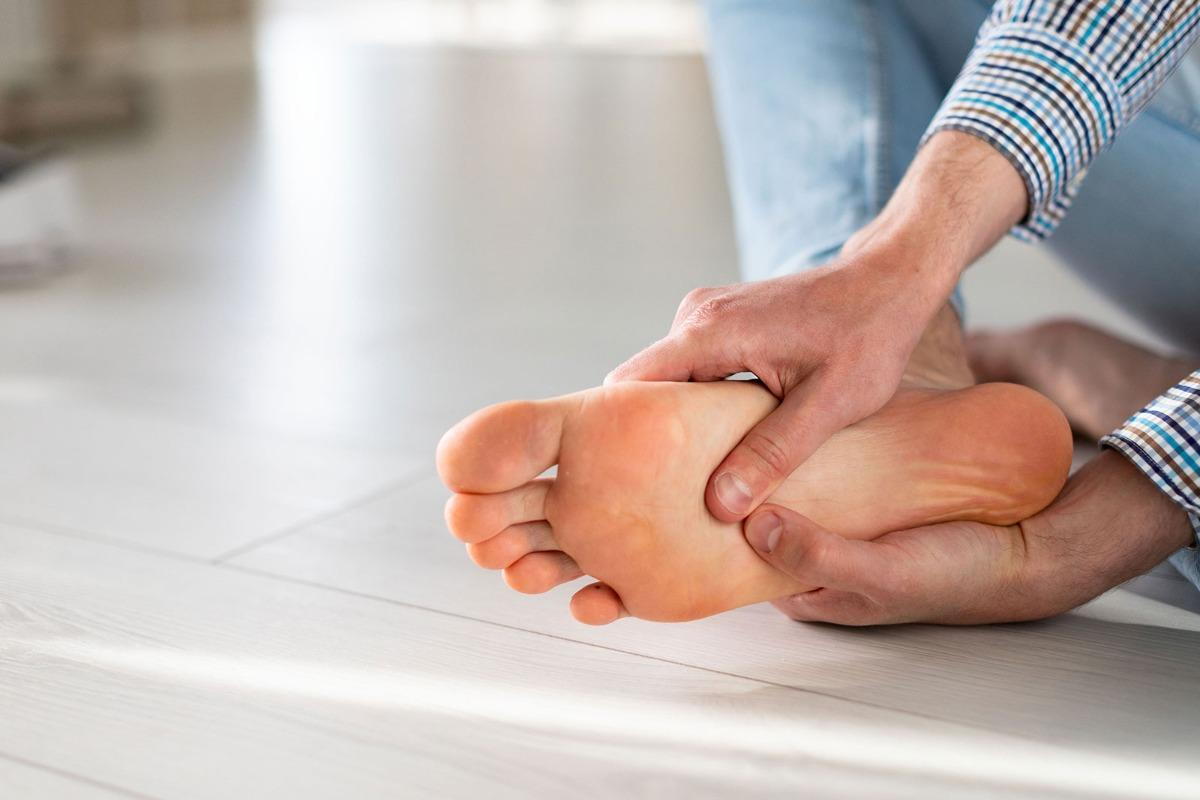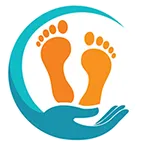What Diseases Can You Get From Walking Barefoot?

- posted: Feb. 08, 2024
Walking barefoot on the beach can be a serene and enjoyable experience. However, it's important to be aware of the potential risks to your foot health. You might be surprised to learn about the various diseases that can be contracted from walking barefoot.
If you're wondering, "What diseases can you get from walking barefoot?" we’re here to provide you with a concise overview of the risks involved.
Additionally, we’ll provide you with practical advice on how to keep your feet healthy and disease-free while still enjoying the freedom of going shoeless. So make sure to read till the end.
Common Fungal Infections From Barefoot Exposure
Fungal infections, such as athlete's foot, thrive in warm and damp environments like locker rooms and pool decks. Walking barefoot in these areas increases your risk of contracting athlete's foot, which can cause itching, burning, and blisters.
To prevent fungal infections, it is recommended to keep your feet clean and dry, especially after walking in communal areas. Wearing sandals or shoes in these environments can provide an added layer of protection.
Viral Infections Lurking on Surfaces
Viral infections, like plantar warts and toenail fungus, can also be contracted through direct contact with contaminated surfaces. These rough-textured warts are caused by the human papillomavirus (HPV) and can be easily acquired in places such as gym showers or swimming pools.
It's important to note that the virus can enter your body through small cuts or breaks in the skin. Wearing footwear can help reduce the risk of exposure to the virus and protect your feet.
Parasitic Infections Through Skin Contact
Parasitic infections, such as hookworm disease, can be contracted by walking barefoot on contaminated soil. The larvae of these parasites can penetrate the skin and eventually make their way to the intestines, causing discomfort and potential complications if left untreated.
To protect yourself more, it's important to avoid sharing footwear, as this can contribute to the spread of these parasitic infections. If you're in an area where hookworm infections are prevalent, wearing shoes and refraining from sharing them can help prevent the entry of parasites into your body.
Bacterial Infections and Their Entry Points
Bacterial infections can occur when bacteria enter the body through cuts or wounds on the skin. Conditions like cellulitis can develop, causing painful redness and potential complications. To reduce the risk of bacterial infections, it is important to clean any cuts or wounds on your feet with soap and water, apply an antiseptic ointment, and cover them with a bandage or dressing. Wearing shoes can provide an additional barrier of protection.
Preventative Measures for Healthy Feet
Without the protection of shoes, your feet are exposed to various potential diseases and infections. To keep your feet in optimal condition, here are some practical steps to follow.
First, prioritize good hygiene. Washing your feet daily with soap and water is essential to prevent infections caused by fungi and bacteria. This simple practice helps maintain cleanliness and reduces the risk of foot-related ailments.
Equally important is wearing appropriate footwear. By choosing shoes that fit well and provide proper support, you create a barrier against sharp objects and potentially contaminated surfaces. This protection minimizes the chances of contracting diseases that can be transmitted through direct contact with the ground.
When To Seek Medical Attention for Foot Problems
It's important to pay attention to any signs of foot problems and seek medical attention from professionals like Dr. Hurst. Persistent foot pain or discomfort could indicate an underlying condition that requires professional evaluation and treatment. For example, sharp pain in the heel that worsens with the first steps in the morning or after prolonged periods of sitting may be a symptom of plantar fasciitis.
Redness, swelling, or open wounds on the feet could indicate an infection that requires medical attention. Numbness or tingling sensations in the feet may be indicative of peripheral neuropathy, a condition often associated with diabetes that requires prompt medical care.
Preventing Barefoot-Related Diseases
So, what diseases can you get from walking barefoot? Risks include infections like athlete's foot, plantar warts, and bacterial infections. To protect yourself, practice good hygiene and wear appropriate footwear. If you experience persistent foot pain or concerning symptoms, seek medical attention promptly. By taking preventive measures and being proactive, you can prioritize your foot health and overall well-being.

- posted: Feb. 08, 2024
Walking barefoot on the beach can be a serene and enjoyable experience. However, it's important to be aware of the potential risks to your foot health. You might be surprised to learn about the various diseases that can be contracted from walking barefoot.
If you're wondering, "What diseases can you get from walking barefoot?" we’re here to provide you with a concise overview of the risks involved.
Additionally, we’ll provide you with practical advice on how to keep your feet healthy and disease-free while still enjoying the freedom of going shoeless. So make sure to read till the end.
Common Fungal Infections From Barefoot Exposure
Fungal infections, such as athlete's foot, thrive in warm and damp environments like locker rooms and pool decks. Walking barefoot in these areas increases your risk of contracting athlete's foot, which can cause itching, burning, and blisters.
To prevent fungal infections, it is recommended to keep your feet clean and dry, especially after walking in communal areas. Wearing sandals or shoes in these environments can provide an added layer of protection.
Viral Infections Lurking on Surfaces
Viral infections, like plantar warts and toenail fungus, can also be contracted through direct contact with contaminated surfaces. These rough-textured warts are caused by the human papillomavirus (HPV) and can be easily acquired in places such as gym showers or swimming pools.
It's important to note that the virus can enter your body through small cuts or breaks in the skin. Wearing footwear can help reduce the risk of exposure to the virus and protect your feet.
Parasitic Infections Through Skin Contact
Parasitic infections, such as hookworm disease, can be contracted by walking barefoot on contaminated soil. The larvae of these parasites can penetrate the skin and eventually make their way to the intestines, causing discomfort and potential complications if left untreated.
To protect yourself more, it's important to avoid sharing footwear, as this can contribute to the spread of these parasitic infections. If you're in an area where hookworm infections are prevalent, wearing shoes and refraining from sharing them can help prevent the entry of parasites into your body.
Bacterial Infections and Their Entry Points
Bacterial infections can occur when bacteria enter the body through cuts or wounds on the skin. Conditions like cellulitis can develop, causing painful redness and potential complications. To reduce the risk of bacterial infections, it is important to clean any cuts or wounds on your feet with soap and water, apply an antiseptic ointment, and cover them with a bandage or dressing. Wearing shoes can provide an additional barrier of protection.
Preventative Measures for Healthy Feet
Without the protection of shoes, your feet are exposed to various potential diseases and infections. To keep your feet in optimal condition, here are some practical steps to follow.
First, prioritize good hygiene. Washing your feet daily with soap and water is essential to prevent infections caused by fungi and bacteria. This simple practice helps maintain cleanliness and reduces the risk of foot-related ailments.
Equally important is wearing appropriate footwear. By choosing shoes that fit well and provide proper support, you create a barrier against sharp objects and potentially contaminated surfaces. This protection minimizes the chances of contracting diseases that can be transmitted through direct contact with the ground.
When To Seek Medical Attention for Foot Problems
It's important to pay attention to any signs of foot problems and seek medical attention from professionals like Dr. Hurst. Persistent foot pain or discomfort could indicate an underlying condition that requires professional evaluation and treatment. For example, sharp pain in the heel that worsens with the first steps in the morning or after prolonged periods of sitting may be a symptom of plantar fasciitis.
Redness, swelling, or open wounds on the feet could indicate an infection that requires medical attention. Numbness or tingling sensations in the feet may be indicative of peripheral neuropathy, a condition often associated with diabetes that requires prompt medical care.
Preventing Barefoot-Related Diseases
So, what diseases can you get from walking barefoot? Risks include infections like athlete's foot, plantar warts, and bacterial infections. To protect yourself, practice good hygiene and wear appropriate footwear. If you experience persistent foot pain or concerning symptoms, seek medical attention promptly. By taking preventive measures and being proactive, you can prioritize your foot health and overall well-being.
Main Location
5729 Centre Square Dr,
Centreville, VA 20120
Monday
7:30 am - 4:00 pm
Tuesday
7:30 am - 4:00 pm
Wednesday
7:30 am - 4:00 pm
Thursday
7:30 am - 4:00 pm
Friday
7:30 am - 3:00 pm
Saturday
Closed
Sunday
Closed
